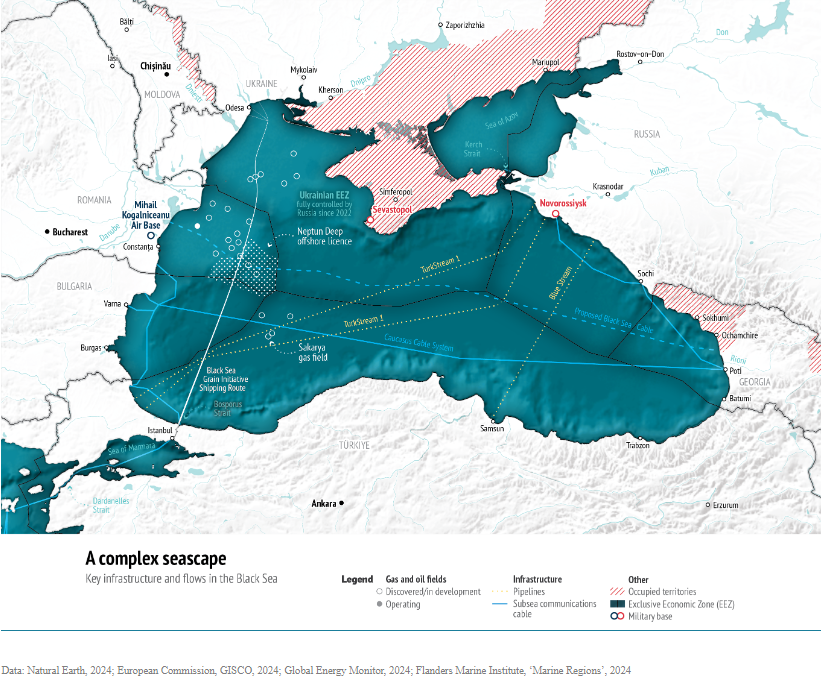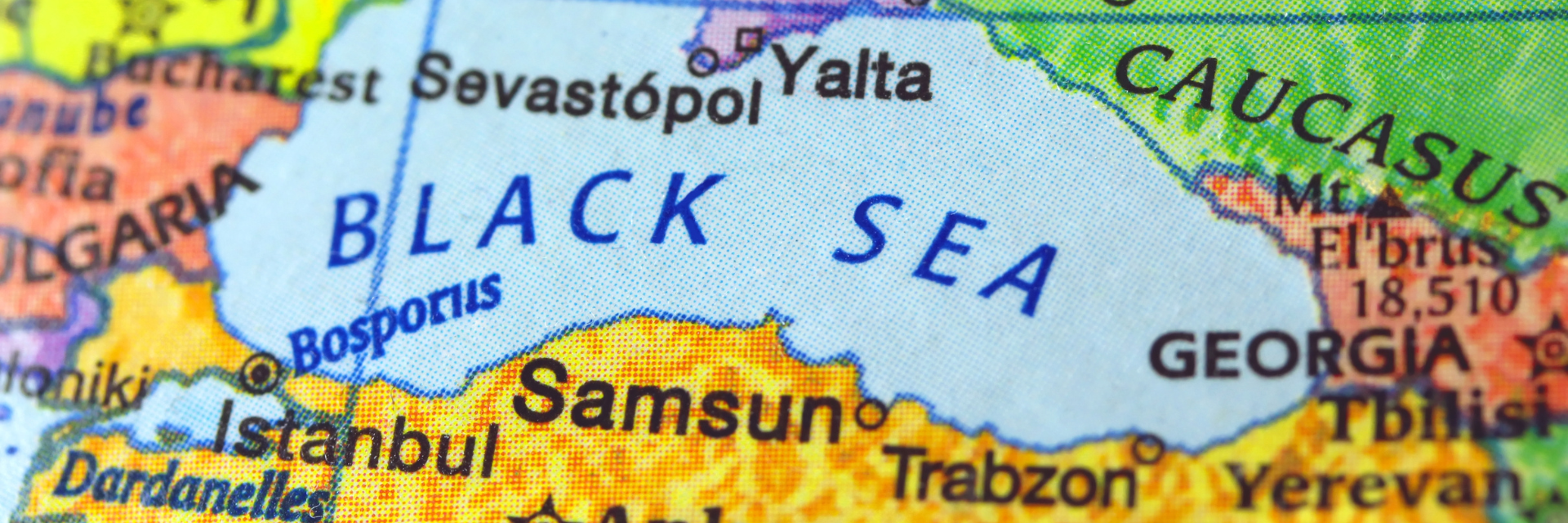Blog by Maria Morante, Dods Political monitoring intern
The Black Sea region has historically played a key bridge role between Europe and Central Asia, representing the only access point to the Mediterranean for a number of states – Bulgaria, Romania, Moldova, Ukraine, Georgia, and Russia. A checkpoint for the Silk Road and other trade routes, it was among one of the most important maritime waterways. Many of the world’s strongest empires – the Greek, Roman, Persian, Byzantine, Ottoman and Russian Empires – fought to rule over the region seeking to secure peace, foster prosperity and promote growth through the dominance of international trade routes.
The aggression by Russia towards Ukraine in 2022 recalled the geostrategic role of the Black Sea, with Russia eager to regain its influence in controlling the maritime lanes and gaining strategic leverage in the region, weaponising food and the supply of energy. Therefore, in light of the current geopolitical scenario, it is not surprising that the Commission decided to review its strategic approach to the Black Sea region. The Joint Communication, published on May 28, was presented by High Representative/Vice-President Kaja Kallas, Commissioner for Enlargement Marta Kos and Commissioner for International Partnerships Jozef Síkela. In her remarks, the HR/VP Kallas emphasised the importance of the region and underlined the desire of the EU to play a leading role and to be recognised as a reliable and predictable partner to countries from the Black Sea region.
The new strategic approach to the Black Sea aims to ensure a “secure, prosperous and resilient” region, boosting connections and growth by linking the EU to Central Asia and beyond through to the South Caucasus. The Commission intends to develop and strengthen “mutually beneficial partnerships” throughout the region with partners like Ukraine, Moldova, Georgia, Türkiye, Armenia and Azerbaijan.
The revised approach is based on three pillars, each with flagship initiatives. The first pillar, enhancing security, stability, and resilience, reflects the necessity of supporting EU Member States and like-minded Black Sea partners to strengthen their defence capabilities in order to respond to external threats. In this regard, the maritime dimension is at the core: the Black Sea is not only crucial for freedom of navigation and safety of shipping, but also for all areas of cooperation in the region, including the blue economy, fisheries and maritime activities. Additionally, the war in Ukraine and developments with Russia’s shadow fleet have further degraded the maritime environment with mining, cybrid and hybrid threats, sabotages and vandalism. As part of the flagship initiatives, the Commission propose to establish a Black Sea Maritime Security Hub to strengthen maritime safety, boost information-sharing and maritime situational awareness, protect critical maritime infrastructure and the marine environment, as well as combat organised crime and human and weapons trafficking.
The second pillar, fostering sustainable growth and prosperity, calls for boosting alternative, resilient and safe corridors and networks in order to strengthen value chains, competitiveness and economic growth in the region. As a flagship initiative, the Commission intends to develop a Connectivity Agenda based on three dimensions: transport, energy and telecommunication. The agenda aims at fostering integrated regional development in synergy with existing policies such as the Eastern Partnership, mobilising investment for agriculture to promote sustainable production standards and food supply, modernising and decarbonising the energy sector in order to meet the EU’s decarbonisation goals, and enhancing the quality of education and skills as key drivers of innovation.
The third pillar, promoting environmental protection, climate change resilience and civil protection, aims at reinforcing preparedness in view of a wide range of risks, from earthquakes, floods, landslides, forest and ground fires to extreme temperature fluctuations. In this regard, the Commission aims to reinforce the preparedness of coastal communities and blue economy sector to enable Black Sea countries to tackle new environmental challenges and seize opportunities for sustainable growth. To that end, the Commission will work with Black Sea communities to boost scientific cooperation, environmental monitoring and data management, and the identification and facilitation of projects to enhance environmental, water and climate change resilience, in cooperation with local authorities, civil society organisations and other stakeholders on the ground.

The new strategic approach to the Black Sea region is part of a broader effort: the newly adopted EU Preparedness Union Strategy, the EU Action Plan on cables security, the White Paper on Defence – Readiness 2030 and the Ocean Pact, along with the upcoming European Democracy Shield and EU Ports Strategy are all part of a new package of EU policy initiatives tailored to address emerging geopolitical challenges and to ensure coherence in European actions.
Complementing these efforts, the recently unveiled Defence Readiness Omnibus package, which was presented by the Commission on 18 June, aims to mobilise up to 800 billion EUR in defence investments over the next four years. It proposes streamlined procedures for defence procurement, intra-EU technology transfers, and fast-tracked permitting, all designed to boost the EU’s defence posture and industrial capacity. The Omnibus addresses critical regulatory bottlenecks that have hindered defence readiness and directly supports the implementation of key objectives from the White Paper on Defence – Readiness 2030. In doing so, it further underpins the security pillar of the Black Sea Strategy by enhancing Europe’s ability to respond quickly and credibly to emerging threats.
Furthermore, the EU will implement the new strategic approach in synergy with the enlargement process, presenting it as an opportunity for interested partners to advance towards the accession to the EU by consolidating the rule of law and democracy, accelerating reforms, aligning with the EU’s Common Foreign and Security Policy (CFSP) and gradually integrating into the European single market. At the same time, the EU will seek to maximise synergies through public and private investments and reforms supported under the Ukraine Facility, the Growth Plan for the Republic of Moldova, the Resilience and Growth Package for Armenia, as well as targeted investments in Azerbaijan and the overall region under the Global Gateway Strategy.
As clearly outlined in the Joint Communication, a coordinated approach with Türkiye remains essential, with “re-engagement” identified as a key element in line with the November 2023 Joint Communication and the European Council conclusions of June 2021 and April 2024. However, this aspect also exposes one of the strategic approach’s potential vulnerabilities, given the often-tense relations between Türkiye and several EU Member States and neighbouring countries. Nevertheless, geopolitical realities urge the EU to maintain dialogue with Türkiye, acknowledging its role in facilitating the success of initiatives such as the Black Sea Grain Initiative and its diplomatic efforts to mediate between Russia and Ukraine. The new approach has also faced criticism concerning its level of ambition: despite the commitment to provide an initial implementation report after one year, the absence of dedicated funding, concrete implementation goals, and a detailed agenda leave space to questions about the overall credibility and effectiveness of the initiative.
